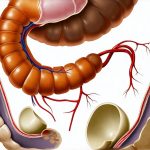The modern world often encourages speed – from fast cars to rapid-fire communication. This relentless pace frequently extends to how we eat, transforming mealtimes into hurried events rather than mindful experiences. Many individuals unknowingly consume their meals too quickly, driven by busy schedules, stress, or simply habit. While seemingly innocuous, this practice can significantly impact our digestive system and overall well-being, leading to a spectrum of uncomfortable symptoms ranging from bloating and gas to more persistent issues like heartburn and even nutrient malabsorption. Understanding the connection between eating speed and digestive discomfort is crucial for cultivating healthier habits and optimizing gut health.
The human digestive system is a remarkably complex process that relies on a carefully orchestrated series of events. It’s not merely about shoving food down; it’s about preparing the body to efficiently break down, absorb, and utilize nutrients from what we consume. When we eat too quickly, we disrupt this delicate balance. We overwhelm the system before it has had adequate time to prepare, short-circuiting crucial digestive processes like chewing, enzyme release, and stomach preparation. This leads to a cascade of potential issues that can manifest as noticeable discomfort. Recognizing these underlying mechanisms is the first step toward mitigating the negative consequences of rapid eating and fostering a more harmonious relationship with food. If you’ve recently changed your diet, such as removing grains, be aware of potential digestive delays.
The Mechanics of Digestion & How Speed Disrupts Them
Digestion isn’t simply what happens in your stomach; it begins the moment you start thinking about food! Anticipation triggers cephalic phase digestion, where your brain signals the release of saliva and digestive enzymes even before the first bite. This prepares the mouth, esophagus, and stomach for incoming sustenance. Chewing is arguably the most important initial step. It mechanically breaks down food into smaller pieces, increasing surface area for enzymatic action. More importantly, thorough chewing stimulates saliva production – saliva contains amylase, an enzyme that begins carbohydrate digestion, and helps lubricate the food bolus for easier swallowing. When we eat quickly, we bypass much of this crucial preparatory phase.
Swallowing too rapidly means larger chunks of food enter the esophagus, potentially overwhelming it and leading to reflux or heartburn. Once in the stomach, these large pieces require more forceful churning and acid production to break down. This increased effort can contribute to bloating, gas, and discomfort. Furthermore, incomplete chewing hinders nutrient absorption because the digestive system struggles to access all the valuable compounds within the food. The small intestine – where most nutrient absorption takes place – relies on adequately broken-down food particles for efficient uptake. A hurried meal often results in undigested or partially digested food reaching the large intestine prematurely, causing fermentation and further gas production. You may also feel bloated after eating too quickly.
Essentially, eating quickly forces your digestive system to play catch-up, constantly working overtime to compensate for insufficient preparation. This chronic strain can contribute to long-term digestive issues and even impact overall health. Consider this analogy: imagine trying to process a large volume of documents without properly sorting or organizing them – it’s chaotic and inefficient. Your digestive system faces a similar challenge when confronted with hastily consumed food.
The Role of the Vagus Nerve & Mindful Eating
The vagus nerve plays a pivotal role in the gut-brain connection, acting as a two-way communication highway between your digestive system and brain. It regulates many essential functions, including heart rate, breathing, and digestion. When you eat slowly and mindfully, signals are sent via the vagus nerve to inform the brain that you’re consuming food, promoting feelings of fullness and satisfaction. This helps prevent overeating and supports optimal digestion. Conversely, rapid eating often bypasses these important signaling mechanisms.
- The vagus nerve detects stretch receptors in the stomach, indicating fullness.
- This information is relayed to the brain, triggering satiety signals.
- Mindful eating – paying attention to each bite, savoring flavors, and recognizing fullness cues – strengthens this connection.
When you eat quickly, these signals are delayed or diminished, leading to overconsumption before your brain registers that you’re full. This contributes to feelings of discomfort and bloating as the stomach becomes overly stretched. Cultivating mindful eating habits is a powerful way to counteract the negative effects of rapid consumption. It’s about consciously slowing down, focusing on the sensory experience of food, and paying attention to internal cues of hunger and fullness. Mindful eating can be a very effective tool for digestive relief.
Chewing: The Forgotten Digestive Step
As mentioned earlier, chewing isn’t just about breaking down food; it’s a fundamental part of the digestive process that is often overlooked. It’s the first mechanical breakdown of food, increasing its surface area for enzymatic digestion. But beyond the physical aspect, chewing also stimulates saliva production, which contains enzymes like amylase to begin carbohydrate breakdown and helps lubricate food for easier swallowing. The more you chew, the easier it is for your stomach to process the food without excessive churning or acid production.
Here are a few techniques to improve your chewing habits:
1. Count your chews: Aim for at least 20-30 chews per bite. This may feel excessive initially, but it becomes easier with practice.
2. Put down your fork between bites: This forces you to slow down and focus on chewing before taking another mouthful.
3. Eliminate distractions: Turn off the TV, put away your phone, and concentrate solely on your meal.
Prioritizing thorough chewing is one of the most effective ways to improve digestion and reduce discomfort. It’s a simple yet powerful habit that can yield significant benefits for gut health and overall well-being. It’s about shifting from a “get it done quickly” mentality to appreciating the act of nourishing your body.
The Impact on Nutrient Absorption & Long-Term Health
The consequences of consistently eating too quickly extend beyond immediate digestive discomfort. Inefficient digestion – stemming from inadequate chewing and rapid transit through the digestive system – can significantly impair nutrient absorption. If food isn’t properly broken down, the small intestine cannot effectively extract vitamins, minerals, and other essential compounds. This can lead to nutrient deficiencies over time, impacting energy levels, immune function, and overall health.
Furthermore, chronic digestive stress from rapid eating can contribute to inflammation in the gut. Inflammation is linked to a wide range of chronic diseases, including irritable bowel syndrome (IBS), Crohn’s disease, and even autoimmune conditions. The constant strain on the digestive system weakens its ability to maintain a healthy microbiome – the community of beneficial bacteria that reside in our gut. A disrupted microbiome can further exacerbate digestive issues and compromise immune function. Therefore, slowing down your eating pace isn’t just about immediate comfort; it’s an investment in long-term health. Emotional eating can also contribute to these issues.
Practical Strategies for Slowing Down
Fortunately, changing your eating habits is achievable with conscious effort and a few practical strategies. The key is to create an environment that encourages mindful consumption and allows you to savor each bite. Start by minimizing distractions during mealtimes – turn off the television, put away your phone, and focus solely on your food. This will help you become more aware of your eating pace and internal cues of fullness.
Consider portion control as a starting point. Smaller portions can naturally encourage slower eating. Use smaller plates and bowls, and avoid serving yourself large quantities of food at once. Before beginning to eat, take a few deep breaths – this helps activate the parasympathetic nervous system, promoting relaxation and aiding digestion. During your meal, pause between bites, put down your fork or spoon, and consciously chew each mouthful thoroughly. This will give your body time to register fullness and prevent overeating.
Finally, prioritize creating a peaceful and enjoyable dining experience. Eat at a table rather than on the go, and share meals with loved ones if possible. These small changes can make a significant difference in your eating habits and contribute to improved digestive health. Remember, it’s not about restricting yourself or adhering to strict rules; it’s about cultivating a more mindful and harmonious relationship with food. If you suspect underlying issues, consider testing for triggers. Also think about seasonal eating tips to support your digestion.


















